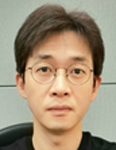교수진 소개

- Name
- Lee, Kyung Yong. PhD
- Faculty Appointment
(title, department)
- Associate Professor
Department of Cancer Biomedical Science, NCC-GCSP
- Area of Expertise
- DNA Damage Response and Genome Instability in Cancer
- Contact no
- 82-31-920-2267
- E-mail
- kylee@ncc.re.kr
- Work Experience
-
Principal Investigator, National Cancer Center (2020 – current)
Research Scientist, School of Medicine University of Virginia USA (2017 – 2020)
Research Associate, School of Medicine University of Virginia USA (2012 – 2017)
Post-doctoral fellow, Seoul National University (2010 – 2012)
- Educational Background
-
PhD : The Interdisciplinary Program in Genetic Engineering, Seoul National University (2010)
Ph.D. Thesis entitled “Cell cycle-dependent phosphorylation and dephosphorylation of ORC2 regulate chromosome replication initiation in human cells.” (Supervisor: Prof. Deog Su Hwang)
BS : Department of Biotechnology, Yonsei University (2002)
- Research Interests
-
Deregulation of DNA damage response leads to significant genetic instability that can result in the development of tumors. And, we know that the ability of cancer cells to repair DNA damages induced by radiation and chemotherapeutic agent impacts therapeutic efficacy. Considering the constant need to develop new therapies and discover new targets for improving cancer treatment, uncovering details of the mechanisms of DNA damage response repair at the molecular level impacts cancer etiology and improves targeted therapies. The goal of my research is to identify novel druggable molecules required for genome integrity and DNA damage repair. Currently, I am trying to figure out how homologous recombination (HR) and non-homologous end joining (NHEJ) are regulated in cancers, and cross-talking with DNA replication and cell cycle checkpoint in the context of cancer biology. We expect that our research outcome contributes to deciphering the impacts of genomic instability on tumorigenesis and identifying novel and innovative targets utilized for cancer treatment.
- International Collaboration
-
Dr. Anindya Dutta at University of Alabama at Birmingham
- Achievements
-
1. Chk1 promotes non-homologous end joining in G1 through direct phosphorylation of ASF1A. Cell Reports. 34(4):108680. DOI: 10.1016/j.celrep.2020.108680. 2021 (IF: 9.423)
2. Targeted CRISPR screening identifies PRMT5 as synthetic lethality combinatorial target with gemcitabine in pancreatic cancer cells. Proc. Natl. Acad. Sci. 117(45): 28068-28079, 2020 (IF: 9.412)
3. The Pan-Cancer Landscape of Prognostic Germline Variants in 10,582 Patients. Genome Medicine. 12(15):https://doi.org/10.1186/s13073-020-0718-7. 2020 (IF: 10.675)
4. The deubiquitinase USP46 is essential for proliferation and tumor growth of HPV-transformed cancers. Molecular Cell. 72(5): 823-835.e5, 2018 (IF: 14.248)
5. ASF1a promotes non-homologous end joining repair by facilitating phosphorylation of MDC1 by ATM at double-strand breaks. Molecular Cell. 68(1):61-75, 2017 (IF: 14.714)
6. MCM8-9 complex promotes resection of double-strand break ends by Mre11-Rad50-Nbs1 complex. Nature Communications. 6:7744 DOI: 10.1038/ncomms8744, 2015 (IF: 11.47)
7. Initiation of replication in Xenopus egg extracts at a spatially defined origin. Cell Cycle. 14:15, 2391-2391, 2015 (IF: 4.565)
8. Dephosphorylation of Orc2 by protein phosphatase 1 promotes the binding of the origin recognition complex to chromatin. Biochemical and Biophysical Research Communications. 13; 448(4): 385-9, 2014. (IF: 2.406)
9. A New lncRNA, APTR, Associates with and Represses the CDKN1A/p21 Promoter by Recruiting Polycomb Proteins. PLoS ONE. 9(4): e95216, 2014. (IF: 3.73)
10. ATR checkpoint kinase and CRL1βTRCP collaborate to degrade ASF1a and thus repress genes overlapping with clusters of stalled replication forks. Genes and Development. 28: 875-887, 2014. (IF: 12.444)
11. Protein phosphatase 1 dephosphorylates Orc2. Biochemical and Biophysical Research Communications. 9; 447(3): 437–440, 2014. (IF: 2.406)
12. Human Primpol1: a novel guardian of stalled replication forks. EMBO Reports. 14(12): 1032-1033, 2013. (IF: 7.189)
13. MCM8-9 complex promotes DNA resection and RPA recruitment in homologous recombination repair. Molecular and Cellular Biology. 33(8): 1632-1644, 2013. (IF: 5.372)
14. Phosphorylation of ORC2 protein dissociates origin recognition complex from chromatin and replication origins. Journal of Biological Chemistry. 287(15): 11891-8, 2012. (IF: 4.773)
15. Human Umbilical Cord Blood-derived Mesenchymal Stem Cells Undergo Cellular Senescence in Response to Oxidative Stress. Stem Cells and Development. 21(11): 1877-86, 2012. (IF: 4.459)
16. TopBP1 deficiency causes an early embryonic lethality and induces cellular senescence in primary cells. Journal of Biological Chemistry. 286(7): 5414-5422, 2011. (IF: 5.328)
17. Human TopBP1 participates in cyclin E/CDK2 activation and preinitiation complex assembly during G1/S transition. Journal of Biological Chemistry. 282(20): 14882-14890, 2007. (IF: 5.808)
18. Dimeric configuration of SeqA protein bound to a pair of hemi-methylated GATC sequences. Nucleic Acids Research. 33(5): 1524-1531, 2005. (IF: 7.26)
